无灵主语有灵主语句的翻译
- 格式:ppt
- 大小:152.50 KB
- 文档页数:12
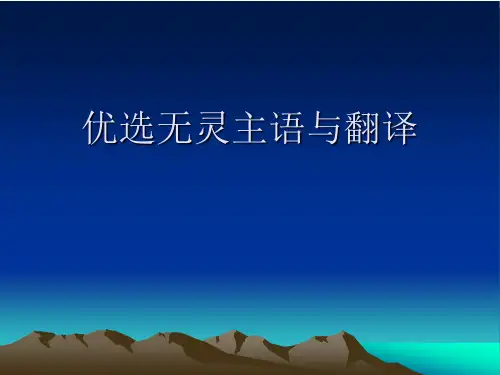
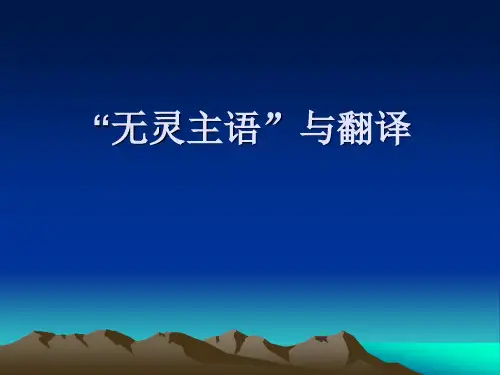
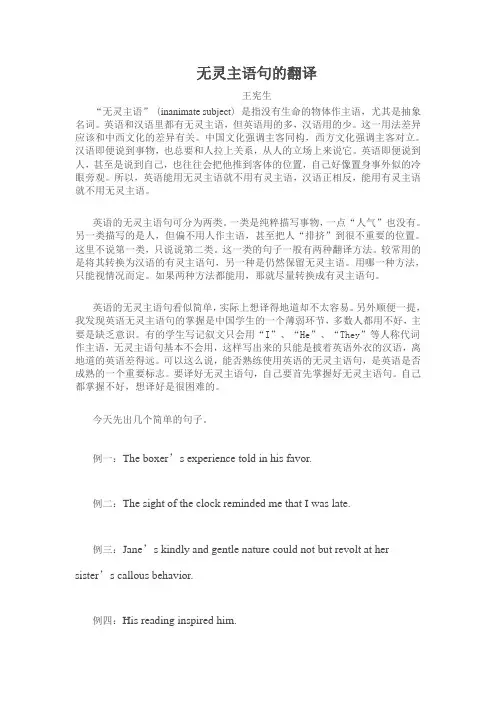
无灵主语句的翻译王宪生“无灵主语” (inanimate subject) 是指没有生命的物体作主语,尤其是抽象名词。
英语和汉语里都有无灵主语,但英语用的多,汉语用的少。
这一用法差异应该和中西文化的差异有关。
中国文化强调主客同构,西方文化强调主客对立。
汉语即便说到事物,也总要和人拉上关系,从人的立场上来说它。
英语即便说到人,甚至是说到自己,也往往会把他推到客体的位置,自己好像置身事外似的冷眼旁观。
所以,英语能用无灵主语就不用有灵主语,汉语正相反,能用有灵主语就不用无灵主语。
英语的无灵主语句可分为两类。
一类是纯粹描写事物,一点“人气”也没有。
另一类描写的是人,但偏不用人作主语,甚至把人“排挤”到很不重要的位置。
这里不说第一类,只说说第二类。
这一类的句子一般有两种翻译方法。
较常用的是将其转换为汉语的有灵主语句,另一种是仍然保留无灵主语。
用哪一种方法,只能视情况而定。
如果两种方法都能用,那就尽量转换成有灵主语句。
英语的无灵主语句看似简单,实际上想译得地道却不太容易。
另外顺便一提,我发现英语无灵主语句的掌握是中国学生的一个薄弱环节,多数人都用不好,主要是缺乏意识。
有的学生写记叙文只会用“I”、“He”、“They”等人称代词作主语,无灵主语句基本不会用,这样写出来的只能是披着英语外衣的汉语,离地道的英语差得远。
可以这么说,能否熟练使用英语的无灵主语句,是英语是否成熟的一个重要标志。
要译好无灵主语句,自己要首先掌握好无灵主语句。
自己都掌握不好,想译好是很困难的。
今天先出几个简单的句子。
例一:The boxer’s experience told in his favor.例二:The sight of the clock reminded me that I was late.例三:Jane’s kindly and gentle nature could not but revolt at her sister’s callous behavior.例四:His reading inspired him.例五:Fortune smiled on him.例六:Aimlessness and failure marked Hitler’s early life.例七:Childhood dearly loves a tale; for its simple heart finds the way out of a reality it does not understand by contriving a world of make-believe.A Research on the International Competitive Power of Transportation Service Exports from Guangdong ProvinceAbstract: Guangdong, as the largest import and export trading power in China, has seen further expansion in international trade in the 21st century, especially after China became a member country of WTO. Since the 90's of the last century, with the rapid development of information technology, transportation service exports has been flourishing globally. Guangdong, being one of the forerunners in Chinese economic reform, shows the state of affairs in the field of international transportation exports.Based on the analysis of development status of transportation service exports from Guangdong, of the necessity of tapping into transportation service exports, of the international competitive power and competitive edge of Guangdong in the field of transportation service exports, I putforward the strategy of improving the international competitive power of Guangdong in transportation service exports.Keywords: Guangdong Province, transportation service, service exports, international competitive power。
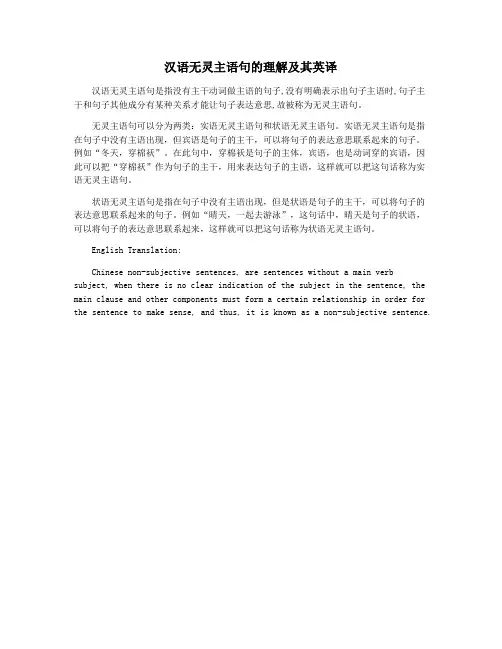
汉语无灵主语句的理解及其英译
汉语无灵主语句是指没有主干动词做主语的句子,没有明确表示出句子主语时,句子主干和句子其他成分有某种关系才能让句子表达意思,故被称为无灵主语句。
无灵主语句可以分为两类:实语无灵主语句和状语无灵主语句。
实语无灵主语句是指在句子中没有主语出现,但宾语是句子的主干,可以将句子的表达意思联系起来的句子。
例如“冬天,穿棉袄”。
在此句中,穿棉袄是句子的主体,宾语,也是动词穿的宾语,因此可以把“穿棉袄”作为句子的主干,用来表达句子的主语,这样就可以把这句话称为实语无灵主语句。
状语无灵主语句是指在句子中没有主语出现,但是状语是句子的主干,可以将句子的表达意思联系起来的句子。
例如“晴天,一起去游泳”,这句话中,晴天是句子的状语,可以将句子的表达意思联系起来,这样就可以把这句话称为状语无灵主语句。
English Translation:
Chinese non-subjective sentences, are sentences without a main verb subject, when there is no clear indication of the subject in the sentence, the main clause and other components must form a certain relationship in order for the sentence to make sense, and thus, it is known as a non-subjective sentence.。


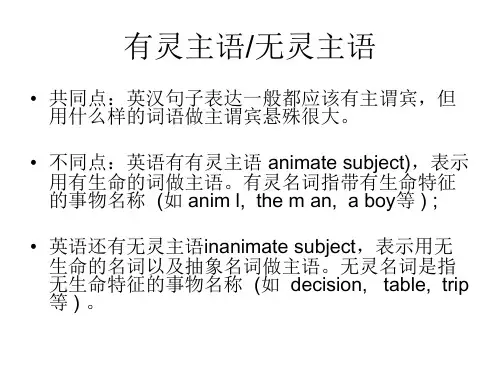
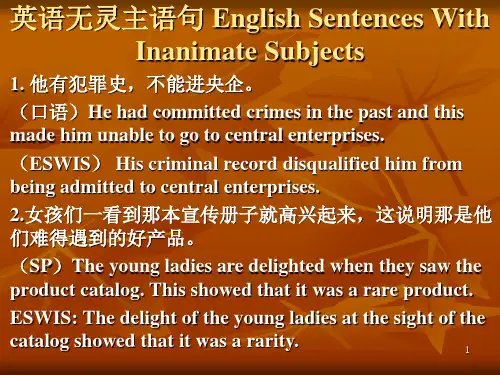
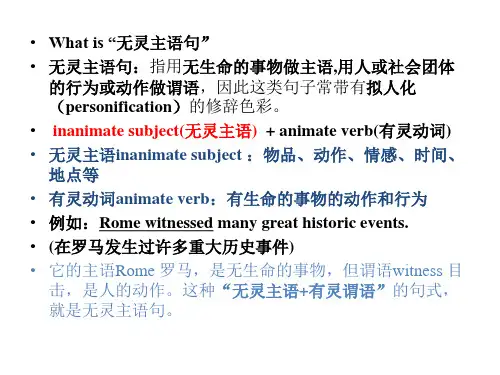
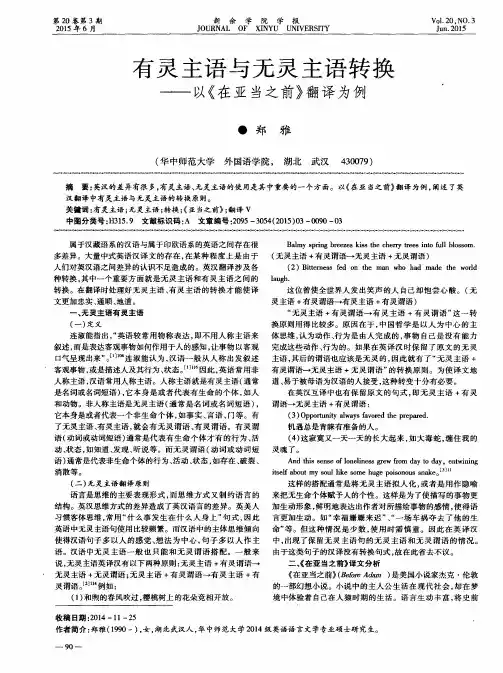

有灵动词与无灵动词的翻译按照动作的执行者是有生命的还是无生命的这一标准,英语和汉语的动词均可分为有灵动词和无灵动词。
前者用在表示有生命的名词后,后者用在表示无生命的名词后。
含有灵动词的句子称作有生命主语句,含无灵动词的句子称作无生命主语句。
英语和汉语在有灵动词和无灵动词上的差别是:有灵动词与无灵动词在英语中无有明确的区别,即一个动词常常是既可用作有灵动词、又可用作无灵动词;而在汉语中这两类动词之间却有明确的区别,即一个用作有灵动词的动词不能同时用作无灵动词。
例如:(1) One reliable source said that major tax changes were being considered by the Treasury. 据可靠消息,财政部正在考虑对税收办法作重大改革。
(2) John said that he would come this evening.约翰说他今晚来。
上述两例中的said 分别与表示无生命的事物的 one reliable source 和表示有生命的John搭配。
前句是无生命主语句,后者是有生命主语句。
动词 say 在前一例中用作无灵动词,在后一例中用作有灵动词。
而汉语中与say相对应的动词是"说",它只能作有灵动词。
如改作无灵动词,则很不符合汉语的表达习惯。
英译汉时一是要弄清英语无生命主语句特点,二是对原句的结构和搭配必须作出相应的调整。
一、英语无生命主语句特点从充当句子主语的词语来看,英语无生命主语句大致有下列几种类型:A. 以时间、地点等名词做主语的句子:(1) 1949 saw the founding of the People's Republic of China.1949年中华人民共和国成立了。
(2) The minutes slipped by quickly.时间一分钟一分钟地溜过去了。
(3) Rome witnessed many great historic events.在罗马城发生过许多伟大历史性事件。